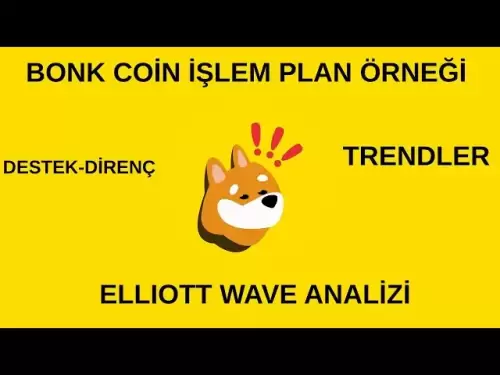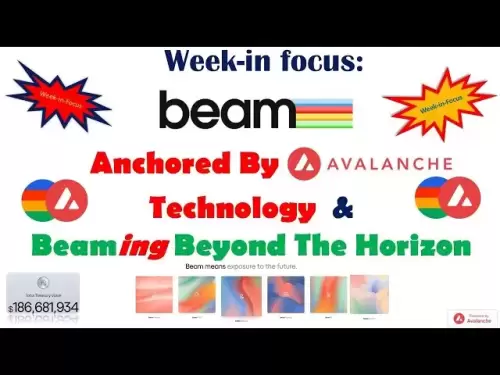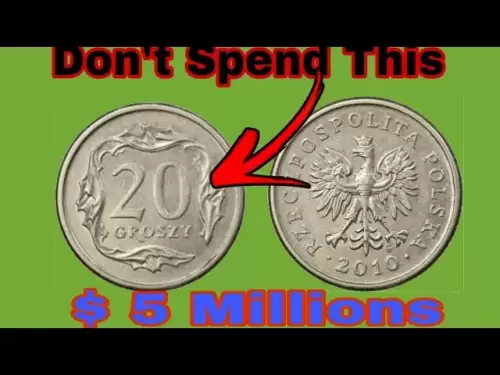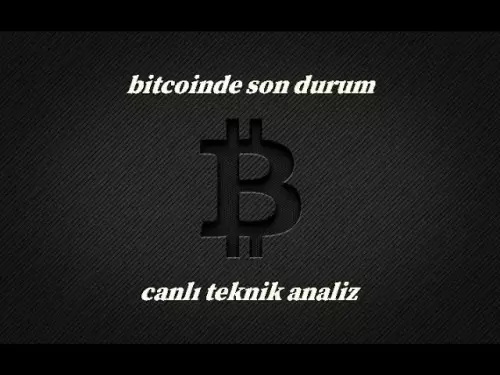-
 Bitcoin
Bitcoin $108,562.4295
0.46% -
 Ethereum
Ethereum $2,533.9553
1.52% -
 Tether USDt
Tether USDt $1.0002
-0.01% -
 XRP
XRP $2.2542
2.23% -
 BNB
BNB $662.4567
1.48% -
 Solana
Solana $151.4114
3.48% -
 USDC
USDC $0.9999
0.00% -
 TRON
TRON $0.2860
0.91% -
 Dogecoin
Dogecoin $0.1685
3.72% -
 Cardano
Cardano $0.5809
1.63% -
 Hyperliquid
Hyperliquid $39.2916
1.85% -
 Sui
Sui $2.8874
0.85% -
 Bitcoin Cash
Bitcoin Cash $496.5801
2.72% -
 Chainlink
Chainlink $13.3582
2.48% -
 UNUS SED LEO
UNUS SED LEO $9.0279
0.07% -
 Avalanche
Avalanche $18.0773
2.30% -
 Stellar
Stellar $0.2426
3.05% -
 Toncoin
Toncoin $2.9086
6.01% -
 Shiba Inu
Shiba Inu $0.0...01170
2.97% -
 Hedera
Hedera $0.1587
3.47% -
 Litecoin
Litecoin $87.4596
1.13% -
 Monero
Monero $317.0425
0.73% -
 Polkadot
Polkadot $3.3778
1.90% -
 Dai
Dai $0.9999
-0.01% -
 Ethena USDe
Ethena USDe $1.0001
-0.01% -
 Bitget Token
Bitget Token $4.4095
0.63% -
 Uniswap
Uniswap $7.3593
6.80% -
 Pepe
Pepe $0.0...09910
3.64% -
 Aave
Aave $274.7388
2.68% -
 Pi
Pi $0.4607
0.48%
What are the security risks of storing altcoins?
Non-custodial altcoins, held in user-controlled wallets, offer enhanced security but mandate stringent personal safeguards, such as robust password management and malware protection.
Jan 07, 2025 at 03:48 am
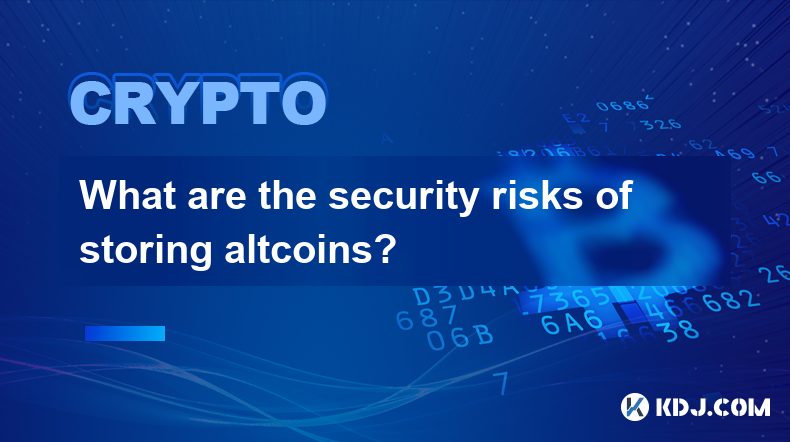
Key Points:
- Understanding the different types of altcoins
- Examining the security risks associated with each type of altcoin
- Implementing effective security measures
Security Risks of Storing Altcoins:
1. Types of Altcoins:
- Exchange-based altcoins: Stored on centralized exchanges, benefiting from robust security measures but susceptible to exchange vulnerabilities and hacks.
- Non-custodial altcoins: Stored in user-controlled wallets, offering greater security but requiring robust personal security practices.
- Hardware wallets: Offline storage devices, providing the highest level of security against online attacks.
2. Exchange Vulnerabilities:
- Phishing attacks: Scams that trick users into revealing sensitive information or downloading malware.
- Security breaches: Exploits targeting exchange systems, leading to theft of funds or account compromise.
- Insider fraud: Malicious activity by exchange employees or compromised accounts.
3. Non-Custodial Wallet Security Risks:
- Private key security: Critical key for accessing funds, requiring robust security measures against theft or loss.
- Malware and viruses: Software attacks that can steal private keys or compromise funds.
- Phishing attacks: Targeting user wallets directly to trick users into revealing passwords or private keys.
4. Hardware Wallet Security Considerations:
- Physical security: Vulnerable to theft, loss, or physical damage, potentially compromising funds.
- Firmware vulnerabilities: Exploits targeting the hardware itself, enabling attackers to steal funds or compromise keys.
- Passphrase security: Additional layer of security, but can be difficult to remember and vulnerable to brute-force attacks.
Effective Security Measures:
- Strong passwords: Using complex, unique passwords for every account related to cryptocurrency.
- Two-factor authentication (2FA): Adding an extra layer of security by requiring a separate authentication code when logging in.
- Hardware wallets: Securely storing altcoins offline in a hardware wallet to minimize online attack exposure.
- Backup and recovery: Maintaining backups of private keys and seed phrases to prevent loss of access to funds.
- Security monitoring: Regularly monitoring accounts for suspicious activity and promptly addressing any potential security concerns.
FAQs:
Q: Are altcoins more secure than Bitcoin?
A: The security of altcoins depends on their underlying technology, the security measures implemented by relevant exchanges or platforms, and user practices.
Q: What are the best ways to protect against phishing attacks?
A: Verify website links, avoid suspicious emails or messages, and never share sensitive information with untrusted parties.
Q: How often should I update my altcoin wallet software?
A: Regularly check for software updates and patch vulnerabilities promptly to minimize security risks.
Q: Can I use the same password for all my crypto accounts?
A: No, it is crucial to use unique and complex passwords for each account to prevent cross-platform compromise.
Q: What are the benefits of using a hardware wallet?
A: Hardware wallets offer the highest level of security by storing private keys offline, protecting against online attacks and hacks.
Disclaimer:info@kdj.com
The information provided is not trading advice. kdj.com does not assume any responsibility for any investments made based on the information provided in this article. Cryptocurrencies are highly volatile and it is highly recommended that you invest with caution after thorough research!
If you believe that the content used on this website infringes your copyright, please contact us immediately (info@kdj.com) and we will delete it promptly.
- XRP's Wild Ride: Bullish Sentiment vs. Market Volatility - What's Next?
- 2025-07-07 09:30:12
- Ethereum Name Service (ENS) Price Forecast 2025-2031: What the Future Holds
- 2025-07-07 08:50:12
- Bitcoin's Outflow Ratio Signals Bullish Trend: Is a Breakout Imminent?
- 2025-07-07 09:30:12
- Standard Chartered's Bold Bitcoin Prediction: $200K by Year-End?
- 2025-07-07 09:50:11
- XRP Price: Rally, Crash, or Just Cruising? A New Yorker's Take
- 2025-07-07 08:55:12
- Worldcoin Price Prediction: Bullish Triangle Hints at Potential Breakout!
- 2025-07-07 08:30:13
Related knowledge

How to customize USDT TRC20 mining fees? Flexible adjustment tutorial
Jun 13,2025 at 01:42am
Understanding USDT TRC20 Mining FeesMining fees on the TRON (TRC20) network are essential for processing transactions. Unlike Bitcoin or Ethereum, where miners directly validate transactions, TRON uses a delegated proof-of-stake (DPoS) mechanism. However, users still need to pay bandwidth and energy fees, which are collectively referred to as 'mining fe...

USDT TRC20 transaction is stuck? Solution summary
Jun 14,2025 at 11:15pm
Understanding USDT TRC20 TransactionsWhen users mention that a USDT TRC20 transaction is stuck, they typically refer to a situation where the transfer of Tether (USDT) on the TRON blockchain has not been confirmed for an extended period. This issue may arise due to various reasons such as network congestion, insufficient transaction fees, or wallet-rela...

How to cancel USDT TRC20 unconfirmed transactions? Operation guide
Jun 13,2025 at 11:01pm
Understanding USDT TRC20 Unconfirmed TransactionsWhen dealing with USDT TRC20 transactions, it’s crucial to understand what an unconfirmed transaction means. An unconfirmed transaction is one that has been broadcasted to the blockchain network but hasn’t yet been included in a block. This typically occurs due to low transaction fees or network congestio...

How to check USDT TRC20 balance? Introduction to multiple query methods
Jun 21,2025 at 02:42am
Understanding USDT TRC20 and Its ImportanceUSDT (Tether) is one of the most widely used stablecoins in the cryptocurrency market. It exists on multiple blockchain networks, including TRC20, which operates on the Tron (TRX) network. Checking your USDT TRC20 balance accurately is crucial for users who hold or transact with this asset. Whether you're sendi...

What to do if USDT TRC20 transfers are congested? Speed up trading skills
Jun 13,2025 at 09:56am
Understanding USDT TRC20 Transfer CongestionWhen transferring USDT TRC20, users may occasionally experience delays or congestion. This typically occurs due to network overload on the TRON blockchain, which hosts the TRC20 version of Tether. Unlike the ERC20 variant (which runs on Ethereum), TRC20 transactions are generally faster and cheaper, but during...

The relationship between USDT TRC20 and TRON chain: technical background analysis
Jun 12,2025 at 01:28pm
What is USDT TRC20?USDT TRC20 refers to the Tether (USDT) token issued on the TRON blockchain using the TRC-20 standard. Unlike the more commonly known ERC-20 version of USDT (which runs on Ethereum), the TRC-20 variant leverages the TRON network's infrastructure for faster and cheaper transactions. The emergence of this version came as part of Tether’s...

How to customize USDT TRC20 mining fees? Flexible adjustment tutorial
Jun 13,2025 at 01:42am
Understanding USDT TRC20 Mining FeesMining fees on the TRON (TRC20) network are essential for processing transactions. Unlike Bitcoin or Ethereum, where miners directly validate transactions, TRON uses a delegated proof-of-stake (DPoS) mechanism. However, users still need to pay bandwidth and energy fees, which are collectively referred to as 'mining fe...

USDT TRC20 transaction is stuck? Solution summary
Jun 14,2025 at 11:15pm
Understanding USDT TRC20 TransactionsWhen users mention that a USDT TRC20 transaction is stuck, they typically refer to a situation where the transfer of Tether (USDT) on the TRON blockchain has not been confirmed for an extended period. This issue may arise due to various reasons such as network congestion, insufficient transaction fees, or wallet-rela...

How to cancel USDT TRC20 unconfirmed transactions? Operation guide
Jun 13,2025 at 11:01pm
Understanding USDT TRC20 Unconfirmed TransactionsWhen dealing with USDT TRC20 transactions, it’s crucial to understand what an unconfirmed transaction means. An unconfirmed transaction is one that has been broadcasted to the blockchain network but hasn’t yet been included in a block. This typically occurs due to low transaction fees or network congestio...

How to check USDT TRC20 balance? Introduction to multiple query methods
Jun 21,2025 at 02:42am
Understanding USDT TRC20 and Its ImportanceUSDT (Tether) is one of the most widely used stablecoins in the cryptocurrency market. It exists on multiple blockchain networks, including TRC20, which operates on the Tron (TRX) network. Checking your USDT TRC20 balance accurately is crucial for users who hold or transact with this asset. Whether you're sendi...

What to do if USDT TRC20 transfers are congested? Speed up trading skills
Jun 13,2025 at 09:56am
Understanding USDT TRC20 Transfer CongestionWhen transferring USDT TRC20, users may occasionally experience delays or congestion. This typically occurs due to network overload on the TRON blockchain, which hosts the TRC20 version of Tether. Unlike the ERC20 variant (which runs on Ethereum), TRC20 transactions are generally faster and cheaper, but during...

The relationship between USDT TRC20 and TRON chain: technical background analysis
Jun 12,2025 at 01:28pm
What is USDT TRC20?USDT TRC20 refers to the Tether (USDT) token issued on the TRON blockchain using the TRC-20 standard. Unlike the more commonly known ERC-20 version of USDT (which runs on Ethereum), the TRC-20 variant leverages the TRON network's infrastructure for faster and cheaper transactions. The emergence of this version came as part of Tether’s...
See all articles























